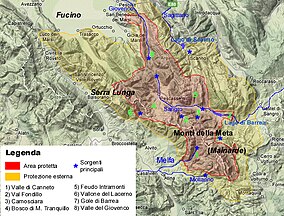Parco Nazionale d'Abruzzo
| Parco Nazionale d'Abruzzo, Lazio e Molise | |
|---|---|
|
IUCN category II (national park)
|
|

A view of the National Park of Abruzzo, Lazio and Molise
|
|
 |
|
| Location | Abruzzo, Lazio, Molise |
| Nearest city | Rome |
| Area | 496.80 km2 (191.82 sq mi) |
| Established | 1922 |
| Governing body | Ministero dell'Ambiente |
| www |
|
Parco Nazionale d'Abruzzo, Lazio e Molise (English: National Park of Abruzzo, Lazio and Molise, often cited under its previous name, Abruzzo National Park) is an Italian national park founded in 1922. The majority of the park is located in the Abruzzo region though it is not constrained by regional boundaries and also includes territory in Lazio and Molise. The park headquarters are in Pescasseroli in the Province of L'Aquila. The park currently includes 496.80 km2 (191.82 sq mi).
The oldest in the Apennines, and the Italy's second declared park, with an important role in the preservation of species such as the Italian wolf, Abruzzo chamois and Marsican brown bear, the protected area is around two thirds beech forest though many other trees grow in the area including the silver birch and black and mountain pines. Other characteristic fauna of the park are roe deer, wild boar and the white-backed woodpecker.
The idea for the Abruzzo National Park arose in the years following World War I thanks to the work of Erminio Sipari, environmentalist, member of Italian Parliament and cousin of Benedetto Croce. Between the months of October and November 1921, the municipality of Opi leased 5 square kilometres of land to a private federation with the aim of protecting flora and fauna and Sipari founded in Rome an organization to administer the reserve. So the Park was founded on September 1922. Over the next few years the territory of the park expanded into neighbouring municipalities until it covered around 120 km² by 1923, when protection was enshrined in law. A period of intense activity followed and the park had further expanded to around 300 km² when it was abolished by the Fascist government in 1933.
...
Wikipedia
